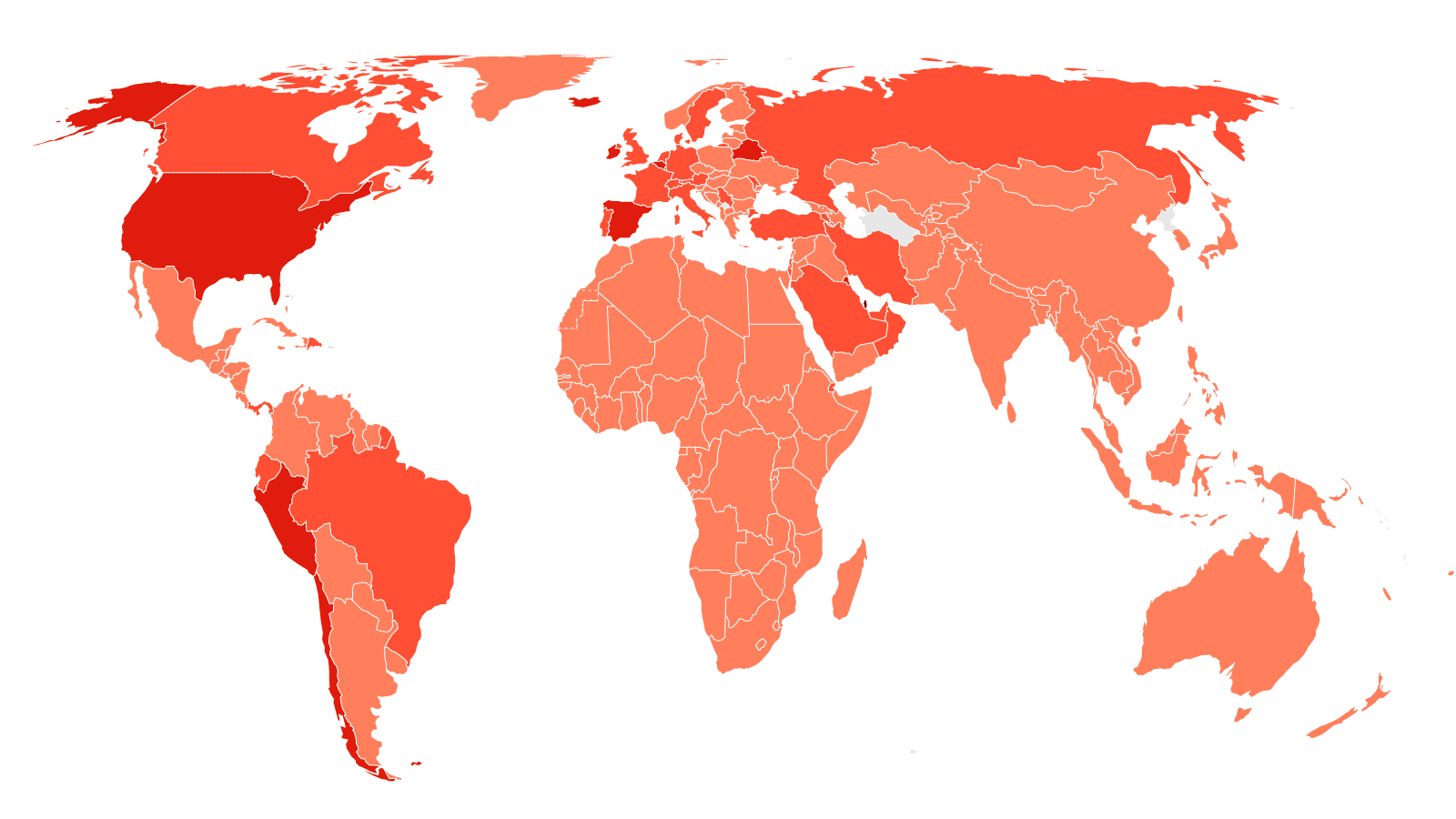India has surpassed 2 million cases of Covid-19
From CNN's Manveena Suri in New Delhi
More than 2 million cases of Covid-19 have been identified in India since the pandemic began, authorities said.
India's Ministry of Health and Family Welfare said Friday morning that it had identified 62,538 new coronavirus cases in the past 24 hours, bringing the nationwide total to 2,027,074. Of those, 41,585 patients have died while more than 1.3 million have recovered.
In India, patients with mild and moderate symptoms are considered no longer active after 10 days of symptom onset if they meet certain conditions. A test to confirm that they no longer have the virus is not required. Severe cases can only be discharged after one negative coronavirus test
Accelerating epidemic: India recorded its first case of Covid-19 on January 30 and hit 1 million cases on July 17.
Since then, cases have been spiking. It took just 12 days for the country to go from 1 million cases to 1.5 million, and then another nine days to reach 2 million cases.
To date, only Brazil and the United States have identified more coronavirus cases than India.
Peru reports highest single-day spike in coronavirus cases
From CNN’s Claudia Rebaza
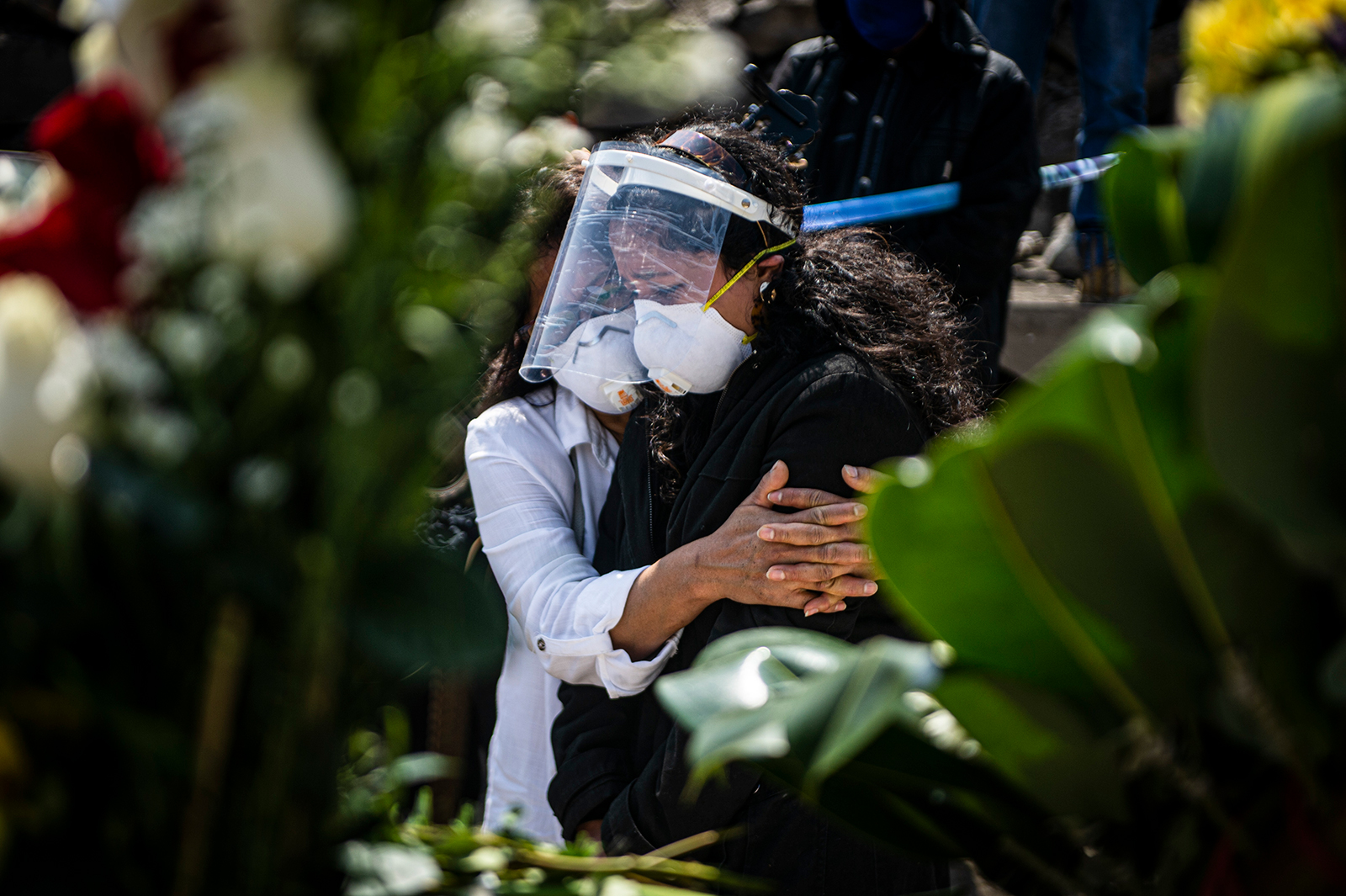 Relatives of a Covid-19 victim mourn during a funeral at a graveyard in Comas, in the northern outskirts of Lima on August 5. Ernesto Benavides/AFP/Getty Images
Relatives of a Covid-19 victim mourn during a funeral at a graveyard in Comas, in the northern outskirts of Lima on August 5. Ernesto Benavides/AFP/Getty ImagesPeruvian authorities identified 7,785 new Covid-19 patients Thursday, the highest number of cases reported in a single day in the country since the pandemic began.
More than 455,000 people have now been diagnosed with the virus in Peru, according to the country's Health Ministry. At least 194 people died from the virus Thursday, bringing the country's death toll to 20,424.
Peru is one of Latin America's hardest-hit countries -- only Mexico and Brazil have recorded more Covid-19 patients -- and cases have been accelerating over the past two weeks.
CNN is tracking worldwide coronavirus cases here:
President Jair Bolsonaro says Brazil is "going to get on with life" as it nears 100,000 Covid-19 deaths
From journalists Rodrigo Pedroso and Fabio Zuker from Sao Paulo
Brazilian President Jair Bolsonaro said in a Facebook Live appearance that his country is "going to get on with life," as it inches closer to recording 100,000 deaths connected to the pandemic.
“We regret all the deaths, right? The number (of deaths by Covid-19) is reaching 100,000. We are going to get on with life and look for a way to get away from this problem,” Bolsonaro said.
Brazil's Covid-19 death toll reached nearly 98,500 on Thursday. More than 2.9 million cases have been identified in the country since the pandemic began.
Bolsonaro later attributed the high number of fatalities to what he described as an error in diagnosing the cause of deaths in Brazil.
More hydroxychloroquine: Bolsonaro also said he might ask US President Donald Trump for more of the controversial drug hydroxychloroquine to help him combat Covid-19.
Hydroxychloroquine is an anti-malarial drug that some have touted as a treatment for Covid-19, but more evidence has been emerging recently that it does not help coronavirus patients. Several studies have found no benefits to treating Covid-19 patients with the antimalarial drug and Dr. Deborah Birx, the White House coronavirus response coordinator, said last month there was “no evidence” that the drug helps treat Covid-19.
Bolsonaro mentioned that Trump donated the drug to the Brazilian government in May and said he can ask for more.
“I accepted the donation of the pills, which have not yet been distributed. I have no problem calling the American president. If (he) has more, send it to us. We will send a plane to get it, or he will send a plane here. And we can distribute this material,” he said.
Japan has now identified more than 900 cases of Covid-19 for 10 days in a row
From CNN's Yoko Wakatsuki in Tokyo
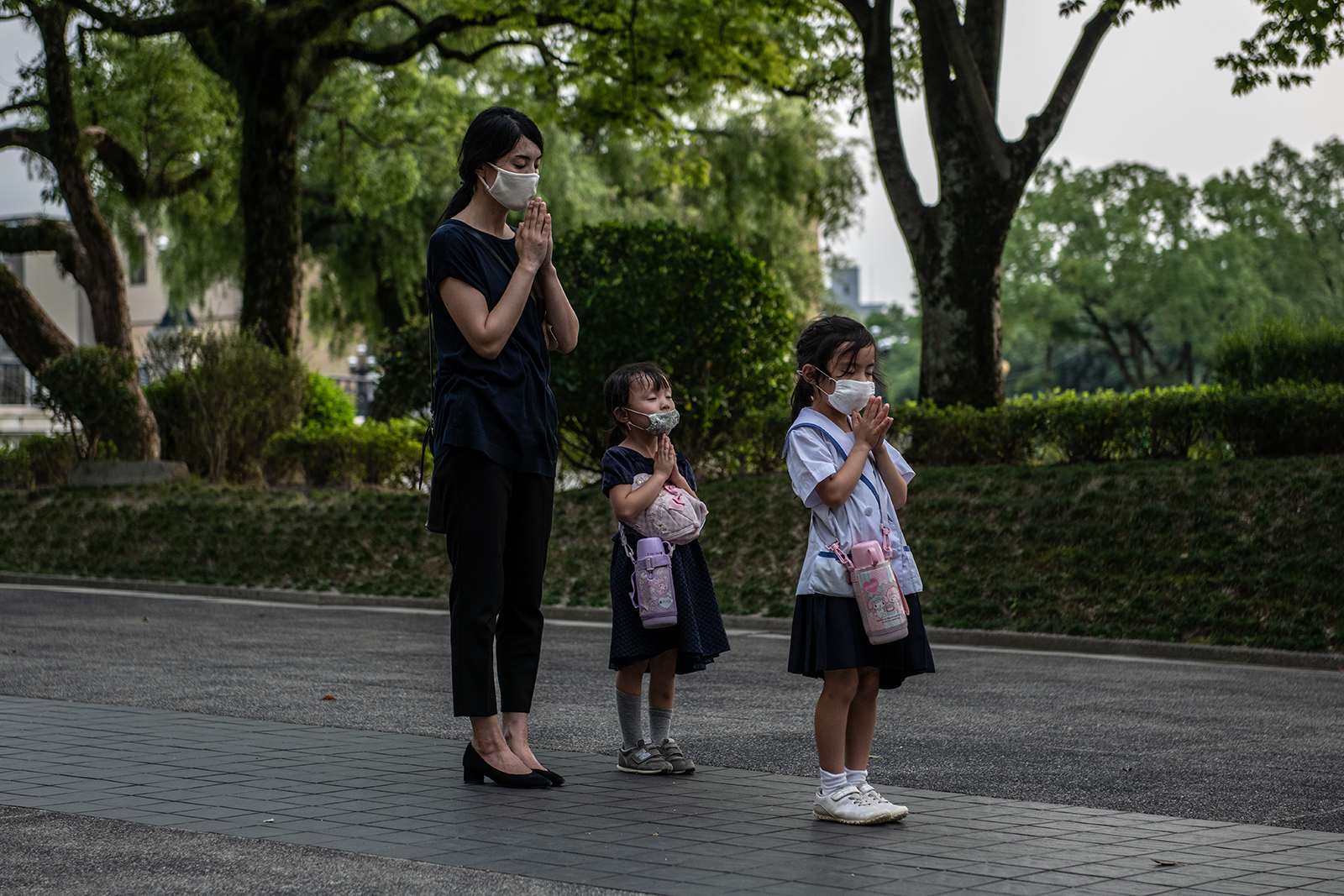 A mother and her daughters pray at the Students Peace Monument on the 75th anniversary of the Hiroshima atomic bombing, on August 6, in Hiroshima, Japan. Carl Court/Getty Images
A mother and her daughters pray at the Students Peace Monument on the 75th anniversary of the Hiroshima atomic bombing, on August 6, in Hiroshima, Japan. Carl Court/Getty ImagesJapan's Health Ministry recorded 1,490 Covid-19 infections on Thursday, the second-highest number of cases the country has identified in a single day during the pandemic and yet another worrying sign that its latest outbreak shows no signs of abating.
Thursday marks the 10th straight day the country has recorded more than 900 cases of the novel coronavirus. Authorities have now identified at least 44,527 cases of Covid-19, more than half of which have been reported since the beginning of July
Seven deaths were reported Thursday, bringing the nationwide death toll to 1,046.
Trouble in Tokyo: Tokyo Gov. Yuriko Koike urged people in the Japanese capital to refrain from traveling during the upcoming Obon summer vacation season to stop the infection spread.
Authorities reported 360 new infections in Tokyo on Thursday, the 10th consecutive day of more than 200 cases in row.
To date, more than 14,500 cases of Covid-19 have been identified in the Japanese capital.
Infections spiking elsewhere: Kanagawa, a prefecture that neighbors Tokyo, crossed the triple digit threshold for the first time Thursday, reporting 119 infections. Osaka also posted its highest number of cases in a single day Thursday, with 225.
5 former CDC directors call for increased leadership in the coronavirus pandemic
From CNN Health’s Lauren Mascarenhas
Five former directors of the US Centers for Disease Control and Prevention (CDC) criticized the contradictory messages put out by President Donald Trump's administration Thursday.
Here's what some of them said:
Dr. Thomas Frieden said that the CDC had been sidelined early on in the pandemic and described Trump’s contradictory messages as “chaotic leadership,” which has led to partisanship, confusion and increased spread of the virus.
“There's no plan. There's no common data that we're looking at to see what's happening with the virus and what's happening with our response.”
Dr. Jeffrey Koplan said that every falsehood put forward by the US government damages the nation’s mitigation efforts against the virus. Americans want information from the CDC, he said.
Dr. Richard Besser said the federal response to the pandemic has been “absolutely unacceptable” considering the US is the wealthiest nation on the planet.
He also criticized politicians for viewing CDC guidelines as an obstacle.
Dr. Julie Gerberding, who headed the CDC under former president George W. Bush, said she hopes that the government can learn from this crisis.
“I really do hope that finally it's gotten so bad that we will reinvent how we think about our health security in the context of our national security,"
Dr. David Satcher, a former US Surgeon General who headed the CDC under former president Bill Clinton, said communities of color that have been hit harder by the pandemic are going to require particular attention during recovery efforts
“It's going to say a lot about us as a nation, whether we step up to this challenge, and remove many of the structural barriers to health that people in this country face," he said.
Stimulus talks on the brink of collapse as two sides trade blame and are no closer to a deal
From CNN's Manu Raju, Lauren Fox and Kristin Wilson
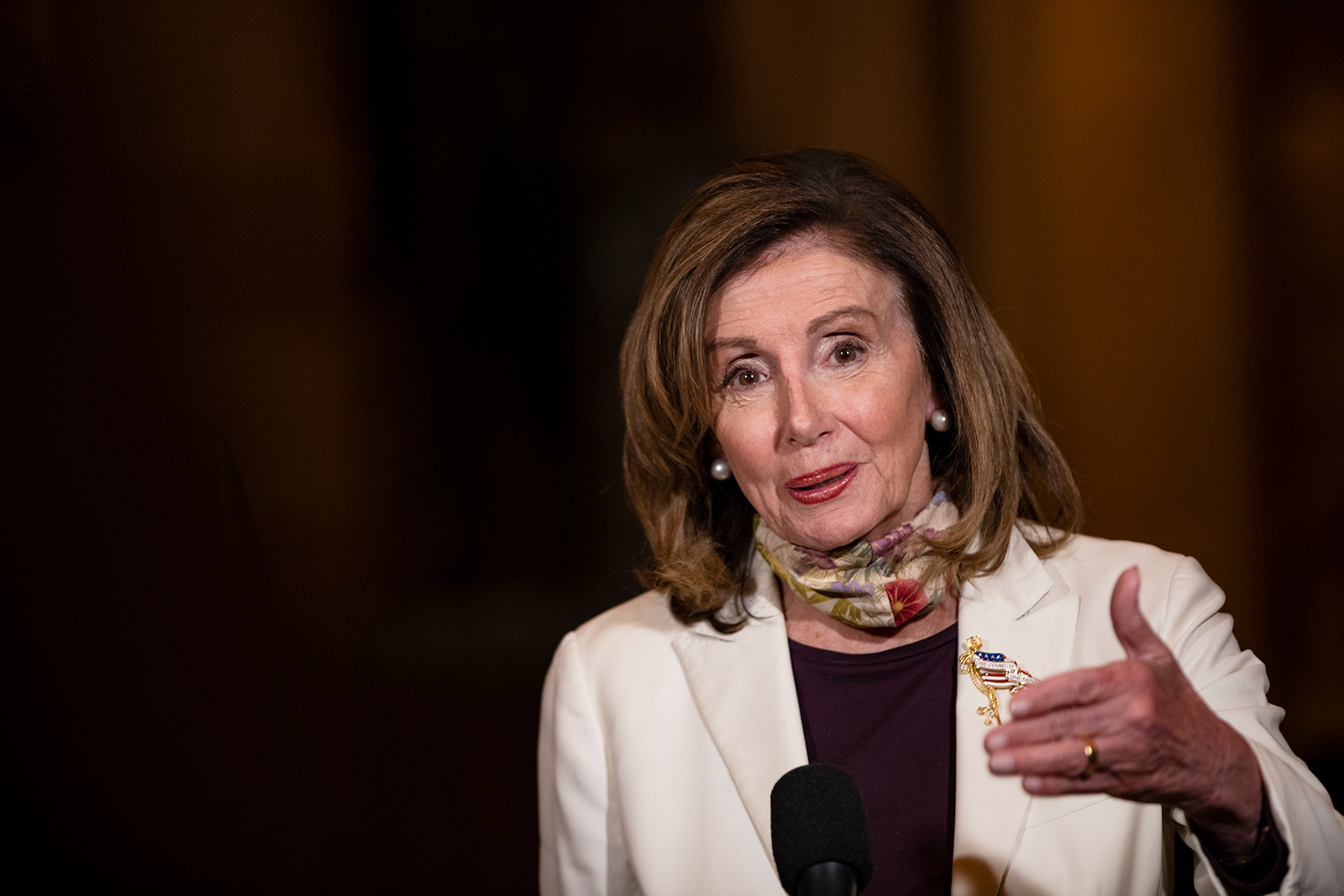 US House Speaker Nancy Pelosi speaks to reporters following continued negotiations with Treasury Secretary Steven Mnuchin and White House Chief of Staff Mark Meadows on a new economic relief bill in response to the coronavirus pandemic on Capitol Hill on August 6, in Washington, DC. Samuel Corum/Getty Images
US House Speaker Nancy Pelosi speaks to reporters following continued negotiations with Treasury Secretary Steven Mnuchin and White House Chief of Staff Mark Meadows on a new economic relief bill in response to the coronavirus pandemic on Capitol Hill on August 6, in Washington, DC. Samuel Corum/Getty ImagesA three-hour meeting between senior administration officials and Democratic leaders yielded little progress tonight as both sides seemed resigned to the likelihood that Congress won’t reach a major stimulus deal amid an economic crisis.
Both sides emerged trading blame for the sputtering talks -- and the administration officials warned that US President Donald Trump would take executive action if no deal is reached by Friday.
It’s unclear if the two sides will meet on Friday.
“We had a consequential meeting that was one way we could see the difference in values that we bring to the table,” House Speaker Nancy Pelosi said.
Pelosi said that White House chief of staff Mark Meadows slammed his hand on the table and stormed out of the room at one point, something that Meadows denied.
The differences remain as they have been: Democrats want to do “something big,” in the words of Pelosi, and the Trump administration wants a “skinny bill,” in the words of Meadows.
One of the biggest sticking points: Aid to state and local governments.
“We are very far apart -- it’s most unfortunate,” Pelosi said.
Schumer said, “We are very disappointed in the meeting ...They were unwilling to meet in the middle.”
Treasury Secretary Steven Mnuchin and Meadows indicated they are “very far apart” on some major issues.
“I think there's a lot of issues we are close to a compromise position on and I think there's a handful of very big issues that we are still very far apart,” Mnuchin said.
Trump called the two officials three times during the meeting and urged them to continue negotiating, Meadows said.
Mnuchin said that if “they could conclude tomorrow without a deal,” Trump will take executive action.
Key coronavirus model projects nearly 300,000 people could die in the US by December
From CNN's Amanda Watts
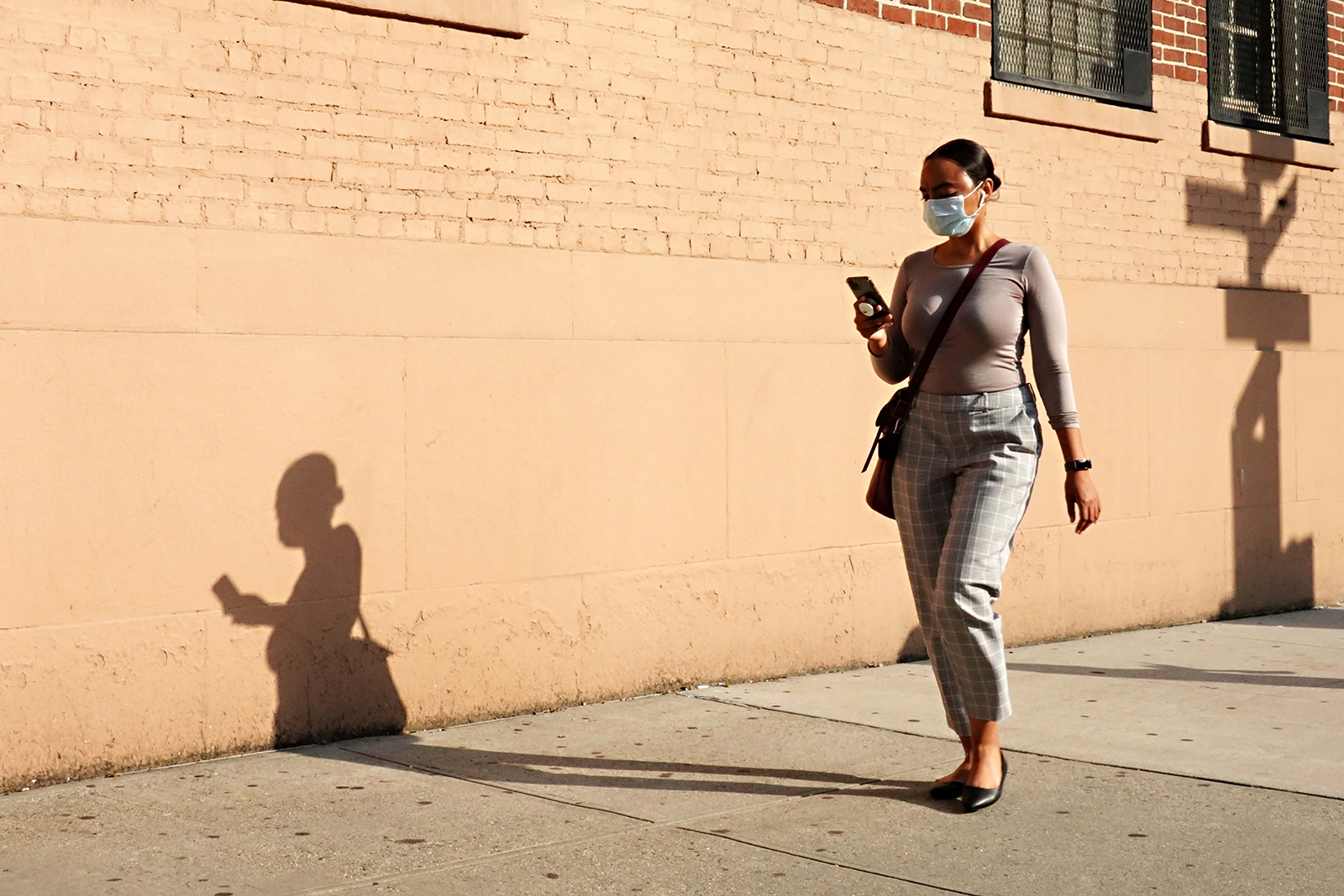 A woman wearing a protective mask walks while looking at a cellphone on August 6, in New York City. Cindy Ord/Getty Images
A woman wearing a protective mask walks while looking at a cellphone on August 6, in New York City. Cindy Ord/Getty ImagesResearchers behind an influential model at the University of Washington are now projecting that the US death toll could reach nearly 300,000 by December 1 -- but that can be changed if consistent mask-wearing occurs.
“America’s Covid-19 death toll is expected to reach nearly 300,000 by December 1; however, consistent mask-wearing beginning today could save about 70,000 lives, according to new data from the Institute for Health Metrics and Evaluation (IHME) at the University of Washington’s School of Medicine,” a statement said.
According to Johns Hopkins University, nearly 160,000 people have died in the United States since the pandemic began. “The US forecast totals 295,011 deaths by December,” the IHME statement said.
The model doesn’t have to come true, said IHME director Dr. Christopher Murray: “The public’s behavior had a direct correlation to the transmission of the virus and, in turn, the numbers of deaths.”
In its previous forecast, published July 7, IHME projected there would be 230,822 US deaths from Covid-19 by November.
“Since July 15, several states have added mask mandates. IHME’s statistical analysis suggests that mandates with no penalties increase mask wearing by 8 percentage points. But mandates with penalties increase mask wearing by 15 percentage points,” the statement said.
This new model assumes that 50% of school districts will have online school in the fall. When schools make their final decisions, this will impact the forecast and IHME “will incorporate them into our future revisions of forecasts.”
US State Department lifts worldwide "Do Not Travel" advisory
From CNN's Jennifer Hansler
The US State Department lifted its global level 4 travel advisory Thursday after more than four months of warning US citizens against traveling abroad.
The State Department issued the level 4 "Do Not Travel" advisory -- the highest level of travel advisory -- on March 19, urging US citizens not to travel overseas due to the coronavirus pandemic.
The State Department will return to its previous system of assigning country-specific advisories since health conditions are "improving in some countries and potentially deteriorating in others," according to a note from the department. This will "give travelers detailed and actionable information to make informed travel decisions."
Despite the lifted State Department advisory, American travelers continue to face travel restrictions in countries worldwide due to rising cases of the deadly disease in the United States.
Covid-19 "pushed the limits of health systems" and left "no country untouched," WHO chief says
From CNN's Naomi Thomas
Covid-19 has been “a tragic reminder to the world of the insecurity and instability disease can cause,” and has shown how critical it is to invest in health, the World Health Organization's director-general said on Thursday.
“The Covid-19 pandemic has changed our world. It has stress tested our political, economic, cultural and social infrastructure,” Tedros Adhanom Ghebreyesus said at the Aspen Security Forum.
“It has pushed the limits of health systems, both weak and strong, leaving no country untouched,” he said. “It has humbled us all.”
The world has learned the lesson that it needs to invest in pandemic preparedness and climate crisis the hard way, Tedros said, and that unless this happens, “we leave ourselves open to enormous harm.”
All countries have been hit hard, he said, high- and low-income alike, with the Americas remaining as one of the epicenters of the virus.
“No single country can fight this virus alone. Its existence anywhere puts lives and livelihoods at risk everywhere,” Tedros said.
It is never too late to turn it around, though he said; using “science solutions and solidarity” together it is possible to overcome the pandemic.
The first coronavirus pandemic has shown how critical health investment is to national security, Tedros said, with universal health coverage being essential for global health security.
WHO’s highest priority is to support all countries in strengthening their health systems so that everyone can access quality services when they are needed, he said.
“For all our differences, we are here, one human race, sharing the same planet -- and our security is interdependent,” he said. “No country will be safe until we are all safe.”
Tedros finished by urging all leaders to choose the path of cooperation, and to act now to end the virus. “It’s not just the smart choice,” he said, “It’s the right choice, and it’s the only choice we have.”

 5 years ago
531
5 years ago
531 